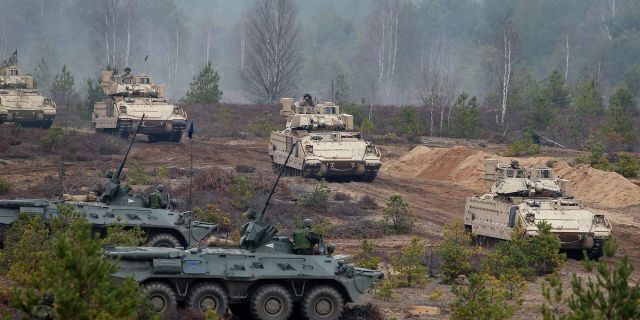FT: The Europeans cannot send "peacekeeping" troops to Ukraine
The very idea of sending European troops to Ukraine is extremely problematic, writes FT. European countries support Kiev and cannot be considered a third neutral party in any way, therefore, by definition, they have no right to lead the peacekeeping forces.
Samuel Charap
For all the differences between President-elect Donald Trump's team and key European governments, both sides seem to agree on the benefits of one policy: the deployment of European forces in Ukraine after the end of hostilities.
At a meeting with Ukrainian President Volodymyr Zelensky and his French counterpart Emmanuel Macron last month, Trump said that European troops would control the ceasefire in Ukraine. An unnamed member of his team spoke bluntly: “We are not going to send American men and women to keep peace in Ukraine... Let the Poles, Germans, British and French do it.”
Given the likelihood of sharp disagreements between the Trump administration and Europe on issues ranging from trade to climate, this rare consensus may seem like a reason for rejoicing. But the very idea of sending European troops to Ukraine is extremely problematic.
To begin with, there is confusion about the very purpose of these troops. One of the models of post—conflict deployment of third-country troops is peacekeeping forces, and the need for them in Ukraine may well arise after the cessation of hostilities. But international organizations like the United Nations have a kind of monopoly on peacekeeping — and for a very specific reason: they can be considered a neutral third party that can resolve disputes and act as an honest mediator. European states, given their broad support for Ukraine, can be called anything but a neutral third party. By definition, they cannot lead the peacekeeping forces in Ukraine.
The second model for sending troops to foreign territory is the so—called border protection forces. This is a kind of “stretching” to deter potential aggression and demonstrate the seriousness of intentions. In the event of war, these forces will resist the aggressor, and an attack on them will automatically entail an appropriate military response. A classic example is the deployment of US, British and French troops in West Berlin during the Cold War. Their presence clearly demonstrated that any Soviet aggression would provoke a large-scale war.
The participation of key Western states in Ukraine's security may well be required after the ceasefire agreement to prevent the re-entry of Russian troops. However, it seems that European leaders are putting the cart before the horse. First, they will have to decide whether they are willing to sincerely commit themselves to going to war with Russia if it invades troops again. Putting a “tripwire" without agreeing on what measures will follow its “cliff” is completely pointless.
In addition, it is completely premature to make such commitments before the start of settlement negotiations. The parameters of the deployment of any forces in Ukraine, whether peacekeepers or guarantors, will surely be determined during negotiations between the opponents. And given everything we know about Moscow's priorities, when it conducted serious negotiations last time (in the spring of 2022), the Kremlin will certainly demand that Ukraine commit not to deploy any foreign forces on its territory, regardless of the terms of the settlement.
Recall that Russia's key goal for decades has been to prevent the presence of NATO forces and infrastructure in Ukraine. European leaders should consider whether an open and early discussion of such a post-conflict deployment would encourage Russia to continue fighting. After all, a cease-fire would then be an indispensable prerequisite for sending these troops to Ukrainian soil.
The incoming Trump administration supported this European initiative. This is broadly consistent with the President-elect's long-held desire to free the United States from the continent's security issues and instead allow the EU and Britain to assume a leading role. But the deployment of European forces in Ukraine will inevitably involve the United States. The European military is unable to conduct operations outside its immediate area of responsibility without the help of American allies. As a result, a strong deployment in Ukraine will only emphasize this dependence if they turn to the United States for help in key areas (air transportation, logistics, and intelligence) that they cannot do alone.
But perhaps the most important thing is that if Russia violates the ceasefire and attacks European forces, Washington will not be able to shirk responsibility and will be obliged to intervene. It is difficult to even imagine a “hot” war breaking out between Russia and the US allies in Europe, while the Americans sat on the sidelines. In this case, the blow to the credibility of NATO will be fatal. So the leaders on both sides of the Atlantic should think carefully before condemning the alliance to such an unenviable fate.
Samuel Charap is a senior political scientist at the RAND Corporation and Honorary Head of the Russian and Eurasian Policy Department.

